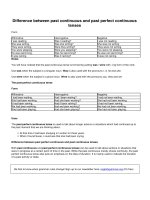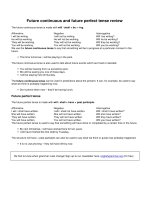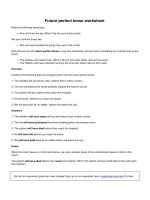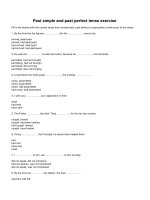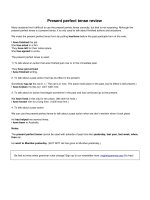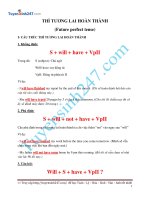Future continuous and future perfect tense review
Bạn đang xem bản rút gọn của tài liệu. Xem và tải ngay bản đầy đủ của tài liệu tại đây (11.43 KB, 1 trang )
Future continuous and future perfect tense review
The future continuous tense is made with
will / shall + be + -ing.
Affirmative Negative Interrogative
I will be writing. I will not be writing. Will I be writing?
He will be working. He will not be working. Will he be working?
They will be working. They will not be working. Will they be working?
You will be working. You will not be working. Will you be working?
We use the
future continuous tense
to say that something will be in progress at a particular moment in the
future.
This time tomorrow, I will be playing in the park.
The future continuous tense is also used to talk about future events which are fixed or decided.
You will be hearing from us sometime soon.
We will be seeing you one of these days.
I will be staying here till Sunday.
The
future continuous tense
can be used in predictions about the present. It can, for example, be used to say
what we think is probably happening now.
Don’t phone them now – they’ll be having lunch.
Future perfect tense
The future perfect tense is made with
will / shall + have + past participle.
Affirmative Negative Interrogative
I will / shall have written. I will / shall not have written. Will / shall I have written?
She will have written. She will not have written. Will she have written?
They will have written. They will not have written. Will they have written?
You will have written. You will not have written. Will you have written?
The future perfect tense is used to say that something will have done or completed by a certain time in the future.
By next Christmas, I will have worked here for ten years.
I will have finished the first draft by Tuesday.
The structure will have + past participle can also be used to say what we think or guess has probably happened.
It is no use phoning – they will have left by now.
Be first to know when grammar rules change! Sign up to our newsletter here: englishgrammar.org (It's free)
Powered by TCPDF (www.tcpdf.org)

